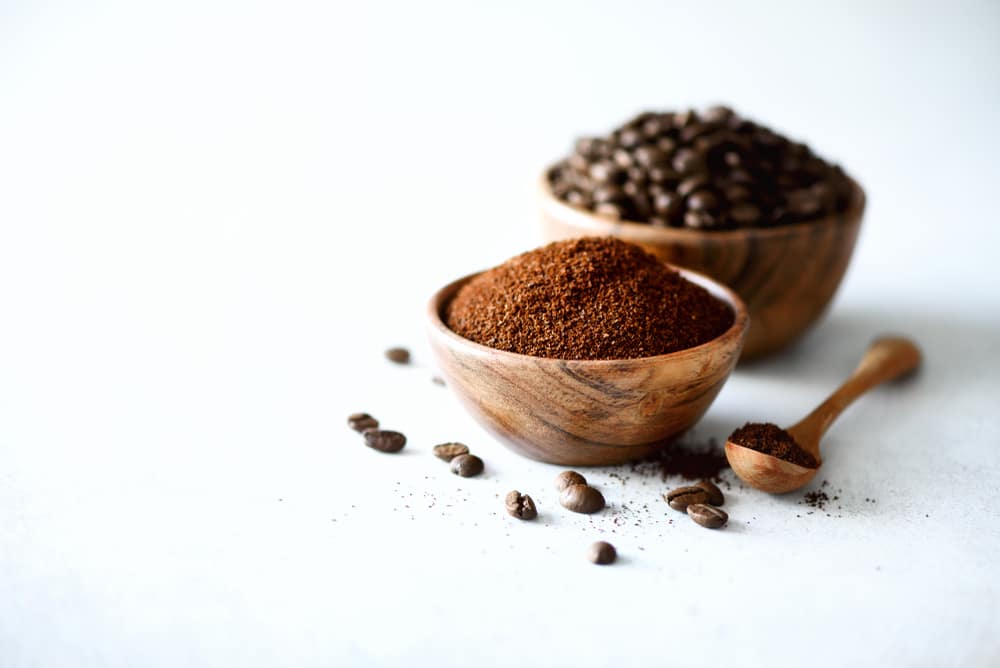While exercising, your body will use up stored energy in the form of glycogen. There is a popular theory that caffeine can help delay this process by working on metabolizing fat stores. If true, this would mean that you might be able to maintain your current level of activity for a long period of time, allowing you to improve your endurance and performance (6).
Get your personalized
meal plan!
Endurance is when you are able to withstand or endure something, like exercise, for a prolonged period. When you have more endurance, you can work out long and hard without reaching your fatigue point quickly (15).
Performance, on the other hand, is a measure of how well you’re able to do something. In terms of exercise, this could be how quickly you run a certain distance, or how much weight you’re able to lift.
You don’t have to be an athlete to benefit from caffeine’s possible effects on exercise metabolism, endurance, and performance. Here’s everything you need to know about how caffeine might help you power through your workout.
How Does Caffeine Affect Exercise Performance?
Caffeine is a central nervous system stimulant that increases alertness and wakefulness. It’s also a diuretic, which means it makes you urinate more, potentially leading to dehydration. Caffeine is found in coffee, tea, energy drinks, soda, chocolate, and some over-the-counter medications (5).
Caffeine might affect exercise performance by:
1. Improving Muscular Endurance
There’s a limit to how long your muscles can work before they become tired. Caffeine may help to delay this process by binding to receptors in the brain that regulate fatigue (6). This could increase the amount of time you can exercise before feeling fatigued.
2. Increasing Anaerobic Exercise Capacity
Anaerobic exercise is a type of high-intensity exercise that relies on short bursts of energy, such as sprinting or lifting weights. Caffeine is thought to increase your anaerobic exercise capacity through various possible mechanisms, including reducing pain perception and perceived exertion (3).
3. Reducing Perceived Exertion
Exercise is hard work, and how hard it feels is partly determined by how your brain perceives it.
Caffeine is thought to reduce perceived exertion by stimulating the nervous system and increasing alertness. This means that you might feel like you’re able to exercise longer or at a higher intensity.
4. Improving Reaction Time
Caffeine may also affect the way your body responds to physical exertion. It increases alertness and wakefulness, which can lead to improved reaction time. This could be beneficial for sports that require quick starts, such as track and field events or football.
Read More: Can You Eat Coffee Beans? Yes, But With Caution

5. Increasing Epinephrine Levels
Epinephrine, also known as adrenaline, is a hormone that’s released by the adrenal glands in response to stress. It increases heart rate, blood pressure, and breathing rate (18). Caffeine increases epinephrine levels, which leads to improved alertness and wakefulness (2).
Being alert and wakeful is important for exercise performance, especially when you’re competing in an endurance event or trying to beat your personal best.
6. Increasing Blood Flow To The Muscles
Caffeine promotes vasodilation, which is the widening of blood vessels. This increases blood flow to the muscles, which delivers more oxygen and nutrients (1).
The increased blood flow also helps to remove waste products, such as carbon dioxide and lactic acid.
7. Boosting Fat Metabolism
Caffeine increases the release of free fatty acids from fat tissue (17). Free fatty acids are used for energy during exercise, which means that caffeine might help you to burn more fat.
8. Preventing Exercise-Induced Muscle Damage
Caffeine is thought to has an anti-inflammatory effect, which might help to reduce exercise-induced muscle damage (12). This is important for recovery and preventing soreness after exercise.
9. Enhancing Mood
Caffeine also has a mood-enhancing effect, which can improve focus and concentration (13). This can be beneficial for exercise performance as it can help you to maintain focus and push through fatigue.
10. Improving Overall Exercise Performance
The effects of caffeine on exercise performance are thought to be cumulative, which means that the more you use it, the greater the effect will be. Regular caffeine consumption has been demonstrated to lead to improved overall exercise performance in some people (7).
If you struggle to even flirt with the idea of giving up your favorite foods or working out till your legs give way – BetterMe app is here to breathe a fresh perspective into the way you view the weight loss process! Check out the app and experience the fun side of fitness and dieting with BetterMe!

How Much Caffeine Should You Take?
The amount of caffeine that’s effective for exercise performance varies from person to person. It also depends on factors such as fitness level and tolerance.
For most people, a dose of caffeine equivalent to 2-3 mg/kg body weight is effective. This is about 150-200 mg for a 150 lb person or 200-300 mg for a 200 lb person.
You can experiment with different doses to see what works best for you. Start with a lower dose and gradually increase it until you find the optimal amount.
It’s also important to remember that tolerance can develop, so you may need to increase your dose over time to maintain the same effect.
Talk to your doctor before adding a caffeine supplement or increasing your caffeine intake. It may not be safe for everyone.
When To Take Caffeine For Maximum Endurance And Performance?
Caffeine is absorbed quickly, so it’s best to take it 30-60 minutes before exercise. This will give it time to reach peak levels in the blood and have its full effect.
How Often Can You Take Caffeine?
Caffeine has a half-life of 3-5 hours, which means that it takes that long for the body to eliminate half of the caffeine you’ve consumed. This means that it will stay in your system for several hours after you’ve taken it.
To avoid negative effects, it’s best to limit your intake to no more than 400 mg per day. This is the equivalent of about 4 cups of coffee (19).
It’s also important to remember that other sources of caffeine, such as soda and energy drinks, can add to your total intake. Be sure to account for these when calculating your daily caffeine consumption.

Are There Any Side Effects?
Caffeine is generally well tolerated, but it can cause side effects in some people. These include:
Jitters
Jitters are a common side effect of caffeine, especially at high doses. They’re caused by the stimulation of the nervous system and can make you feel anxious or restless (19).
Jitters feel like a case of the nerves and can include symptoms such as:
- Shakiness
- Racing heart
- Dizziness
- Anxiety
- Headaches
If you experience jitters from caffeine, it’s best to reduce your dose or avoid it altogether.
Insomnia
Another common side effect of caffeine is insomnia. Caffeine can interfere with sleep by disrupting the body’s natural sleep-wake cycle (14). This can be a problem if you’re trying to exercise early in the morning or if you’re taking caffeine late in the day.
If you have trouble sleeping, it’s best to avoid caffeine after 2 pm. This will give your body enough time to metabolize the caffeine and allow you to sleep better at night.
Read More: Bulletproof Coffee Fasting: Should You Say No To Keto Coffee When You’re On A Fast
Dehydration
Caffeine is a diuretic, which means that it can cause you to lose more water than you take in (9). This can lead to dehydration, especially if you’re exercising in a hot environment.
To avoid dehydration, it’s important to drink plenty of fluids before, during, and after exercise. This will help to offset the fluid loss from sweating and urination.

Tips For Using Caffeine To Improve Exercise Endurance And Performance
There are several ways that you can use caffeine to improve your exercise endurance and performance. Here are a few tips:
Take Pure Supplements
While caffeinated beverages like energy drinks may be a convenient source of much-needed energy before a workout, they also contain other ingredients that may not be so beneficial such as large amounts of sugar (16).
Pure caffeine supplements provide a more concentrated source of energy without the extra calories.
Stack Caffeine With Creatine
Creatine is a popular supplement among athletes and bodybuilders because it has been shown to help improve performance (11). When stacked with caffeine, you’ll get the benefits of both substances on exercise endurance.
Start Small And Increase Dose Gradually
If you are new to using caffeine for exercise, it is important to start small and increase your dose gradually. Taking too much caffeine all at once can lead to side effects such as jitters and anxiety (4). Start with a low dose of around 50-100mg and increase as needed.
Use Caffeine Sparingly
While caffeine can be a great tool to help improve exercise performance, it should not be used all the time. Caffeine can lead to dependency and tolerance (10). Use it sparingly and give your body a break from time to time to avoid these issues.
Timing Is Key
When you take caffeine can be just as important as how much you take. Habitually taking caffeine first thing in the morning can lead to tolerance. To avoid this, take caffeine about 30-60 minutes before you need it for energy.
Think of it as a pre-workout supplement to take rather than coffee.
Whether you’re a workout beast or just a beginner making your first foray into the world of fitness and dieting – BetterMe has a lot to offer to both newbies and experts! Install the app and experience the versatility first-hand!

Final Thoughts
Caffeine is a popular performance-enhancing supplement that can improve exercise endurance and performance.
The amount of caffeine that’s effective for exercise performance varies from person to person. A dose of 2-3 mg/kg body weight is typically used.
Caffeine is absorbed quickly, so it’s best to take it 30-60 minutes before exercise.
Caffeine has a half-life of 3-5 hours, which means that it will stay in your system for several hours after you’ve taken it. To avoid tolerance, it’s best to limit your intake to no more than 400 mg per day.
Common side effects of caffeine include jitters, insomnia, and dehydration, so moderation is key.
Talk to your doctor before adding a caffeine supplement or increasing your caffeine intake. It may not be safe for everyone.
DISCLAIMER:
This article is intended for general informational purposes only and does not serve to address individual circumstances. It is not a substitute for professional advice or help and should not be relied on for making any kind of decision-making. Any action taken as a direct or indirect result of the information in this article is entirely at your own risk and is your sole responsibility.
BetterMe, its content staff, and its medical advisors accept no responsibility for inaccuracies, errors, misstatements, inconsistencies, or omissions and specifically disclaim any liability, loss or risk, personal, professional or otherwise, which may be incurred as a consequence, directly or indirectly, of the use and/or application of any content.
You should always seek the advice of your physician or other qualified health provider with any questions you may have regarding a medical condition or your specific situation. Never disregard professional medical advice or delay seeking it because of BetterMe content. If you suspect or think you may have a medical emergency, call your doctor.
SOURCES:
- Caffeine’s Vascular Mechanisms of Action (2010, hindawi.com)
- Caffeine affects cardiovascular and neuroendocrine activation at work and home (2002, pubmed.ncbi.nlm.nih.gov)
- Caffeine and Anaerobic Performance (2012, link.springer.com)
- Caffeine and diazepam: separate and combined effects on mood, memory, and psychomotor performance (1985, pubmed.ncbi.nlm.nih.gov)
- Caffeine and exercise: metabolism, endurance and performance (2001, pubmed.ncbi.nlm.nih.gov)
- Caffeine and Exercise (2012, link.springer.com)
- Caffeine and Exercise Performance: Possible Directions for Definitive Findings (2020, frontiersin.org)
- Caffeine Effects on the Central Nervous System and Behavioral Effects Associated with Caffeine Consumption (2014, ncbi.nlm.nih.gov)
- Caffeine ingestion and fluid balance: a review (2003, pubmed.ncbi.nlm.nih.gov)
- Caffeine Use Disorder: A Comprehensive Review and Research Agenda (2013, ncbi.nlm.nih.gov)
- Creatine for Exercise and Sports Performance, with Recovery Considerations for Healthy Populations (2021, mdpi.com)
- Effect of Caffeine Ingestion on Indirect Markers of Exercise-Induced Muscle Damage: A Systematic Review of Human Trials (2022, mdpi.com)
- Effects of Caffeine on Cognitive Performance, Mood, and Alertness in Sleep-Deprived Humans (1994, ncbi.nlm.nih.gov)
- Effects of caffeine on sleep quality and daytime functioning (2018, ncbi.nlm.nih.gov)
- Endurance – an overview (n.d., sciencedirect.com)
- Energy Drink Consumption: Beneficial and Adverse Health Effects (2015, ncbi.nlm.nih.gov)
- Metabolic effects of caffeine in humans: lipid oxidation or futile cycling? (2004, academic.oup.com)
- Physiology, Adrenal Gland (2022, ncbi.nlm.nih.gov)
- The Safety of Ingested Caffeine: A Comprehensive Review (2017, frontiersin.org)










